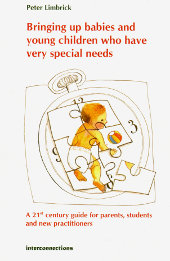Bringing up babies and young children who have very special needs.
 |
Bringing up babies and young children who have very special needs. A 21st century guide for parents, students and new practitionersWritten Peter Limbrick 2019 102 pages £14.75 (+ P&P*) (Discount available for unwaged parents of children who have special needs.**) Select postage:
* If purchasing mutliple books contact This email address is being protected from spambots. You need JavaScript enabled to view it. for a postage discount. ** Contact This email address is being protected from spambots. You need JavaScript enabled to view it. for this discount. Contents
Introduction - first paragraphs This small book is written for people who are coming new to the world of babies and young children who have very special needs. I hope this will include new parents, others with a parenting role, family members, students who might eventually work with these children and people who have just moved into this field of work. It can often feel like a world separated from the main world because babies and infants who have very special needs belong to a small minority most people will not encounter very often if at all. I have used the phrase ‘bringing up’ in the book’s title, because this is what parents all around the world do and it is what this book is about. Parents bring up their children as best they can whatever abilities and needs their children have. But, unfortunately, when a baby or young child has very special needs it can feel that some of this parenting role is taken over by one or more practitioners. Parents might then find themselves inappropriately forced into a secondary or subservient role because practitioners appear as experts and because parents do not yet know all the same things the practitioners know. This book, then, is about parents bringing up their young children and how the main task of agencies and their practitioners in both hospital and community-based services is to respect and support parents in this role. There is very clear recognition here that parents have the most important role and responsibility. The treatments and programmes provided by practitioners must be supplementary to and supportive of this parental role. While an ideal is some sort of partnership, parents must be in the leading role making the important decisions about support for their child and family. It is common in every country for parents of all young children to ask for help when they need it – during pregnancy, after the birth or in the coming months and years. The up-to-date support I am describing in this book follows this natural approach. In this, parents bring up their babies and infants who have very special needs as best they can and ask for help when they need it. Roles are very clear in this:
Text from back cover Peter Limbrick is an educationalist with long experience of babies and young children who have multiple diagnoses. His approach helps children who have disabilities and very special needs learn basic skills and supports parents with all they have to deal with. This book is about support children and families might need. It contrasts effective 21st century support with approaches that are out-of-date and, at worst, insensitive and institutional. Peter describes three essential pillars of effective support:
Peter tells us there is no time to waste and roles are very clear: Parents’ role is to bring up their children. The role of therapists, teachers and other practitioners is to help them. Even so, many parents have to go into battle to get what they need. |

